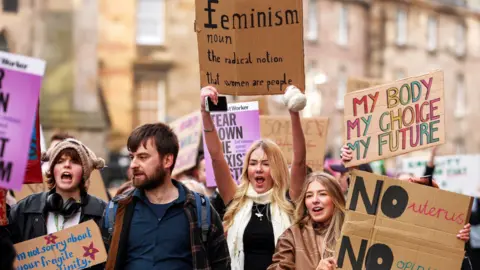The Scottish government has recently made headlines with its announcement to drop plans for the proposed misogyny law before the forthcoming Holyrood election scheduled for next year. The development has sparked discussions among various stakeholders and advocates for women’s rights and has implications for broader societal issues, particularly concerning protections against gender-based discrimination and harassment.
For quite some time, there has been a strong push for legislative measures aimed at enhancing protections for women and girls in Scotland. However, the government has conveyed that time constraints, particularly in light of a recent Supreme Court ruling pertaining to the definition of a woman, hinder the introduction of this anticipated law. As a result, ministers have indicated their intention to amend existing hate crime legislation to provide protections based on sex, rather than launching a brand-new piece of legislation focused solely on misogyny.
In addition to deprioritizing the misogyny law, the government has also confirmed that it will not advance legislation aimed at banning conversion therapy during this parliamentary term. Instead, it is seeking a comprehensive UK-wide solution to this issue which has garnered significant media attention and public concern.
The deep-rooted need for a new misogyny law emerged after an expert group wrote reports backing the case for distinct legislation rather than merging the concepts of misogyny and broader hate crime. This expert group, led by Baroness Helena Kennedy KC, voiced that women should not be considered as a minority and argued for a more robust and fundamental set of legal responses to combat the issue effectively. Their recommendations included the creation of five new offenses under the proposed Misogyny Act, which aimed to criminalize acts such as stirring up hatred against women and undertaking misogynistic harassment.
The potential implementation of the noticeable aggravating factors linked with misogyny in crimes was also on the table, which could translate to harsher penalties for offenders found guilty of such crimes. The Scottish government had originally aimed to align its approach with the pressing need for enhanced legal measures as recognized by the expert advisory group.
In light of the latest developments, the Scottish government has reiterated its commitment to tackling misogynistic abuse, labeling it as a complex area of policy and law. Ministry spokespersons emphasized the necessity for more time to thoroughly evaluate the legal implications stemming from the recent Supreme Court decision regarding the biological definition of a woman. It has been stated that there simply isn’t enough time to proceed with the proposed misogyny bill during this parliamentary session. Nevertheless, the government plans to introduce the inclusion of sex as a protected characteristic under Scotland’s hate crime legislation, a measure set to happen in September.
Moreover, plans to enact a law outlawing conversion therapy have also been sidelined. Previously, ministers had expressed a desire for Scotland to lead in this legislative respect. However, invoking a sense of urgency, the government has called upon the Labour administration at Westminster to take charge of this matter. Equalities Minister Kaukab Stewart emphasized that should a unified approach across Scotland, England, and Wales fail to materialize, the Scottish government would be compelled to introduce its own legislative measures post the next Holyrood election.
With the ongoing conversations surrounding these critical issues of women’s rights, misogyny, and LGBTQ+ protections, the implications of the decision not to pursue the planned misogyny law resonate deeply within societal frameworks. Constituents and advocates alike are watching closely as policy discussions continue to unfold, with hopes for a more equitable legal future in Scotland.



